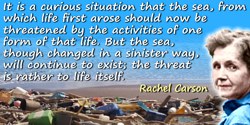Rachel Carson Quotes on Earth (13 quotes)
>> Click for 43 Science Quotes by Rachel Carson
>> Click for Rachel Carson Quotes on | Beauty | Child | Discovery | Environment | Fact | Insect | Knowledge | Life | Nature | Science | Sea | Survival | Tide | Truth | Water | Wonder | World | Year |
>> Click for 43 Science Quotes by Rachel Carson
>> Click for Rachel Carson Quotes on | Beauty | Child | Discovery | Environment | Fact | Insect | Knowledge | Life | Nature | Science | Sea | Survival | Tide | Truth | Water | Wonder | World | Year |
I believe natural beauty has a necessary place in the spiritual development of any individual or any society. I believe that whenever we substitute something man-made and artificial for a natural feature of the earth, we have retarded some part of man’s spiritual growth.
— Rachel Carson
As quoted in Linda Lear, Rachel Carson: Witness for Nature (1997), 259.
In every outthrust headland, in every curving beach, in every grain of sand there is a story of the earth.
— Rachel Carson
In 'Our Ever-Changing Shore', Holiday (Jul 1958). Collected in Lost Woods: The Discovered Writing of Rachel Carson (2011), 114.
It is a wholesome and necessary thing for us to turn again to the earth and in the contemplation of her beauties to know the sense of wonder and humility.
— Rachel Carson
In 'The Exceeding Beauty of the Earth', This Week Magazine (1952). As cited in Karen F. Stein, Rachel Carson: Challenging Authors (2013), 55.
It took hundreds of millions of years to produce the life that now inhabits the earth–eons of time in which that developing and evolving and diversifying life reached a state of adjustment and balance with its surroundings.
— Rachel Carson
In Silent Spring (1962), 6.
Mankind has gone very far into an artificial world of his own creation. He has sought to insulate himself, in his cities of steel and concrete, from the realities of earth and water and the growing seed. Intoxicated with a sense of his own power, he seems to be going farther and farther into more experiments for the destruction of himself and his world.
— Rachel Carson
From speech upon receiving the John Burroughs Medal (Apr 1952) in New York, awarded for her book, The Sea Around Us. As collected in Rachel Carson and Linda Lear (ed.), 'Design for Nature Writing', Lost Woods: The Discovered Writing of Rachel Carson (1998, 2011), 94.
Sand is a substance that is beautiful, mysterious, and infinitely variable; each grain on a beach is the result of processes that go back into the shadowy beginnings of life, or of the earth itself.
— Rachel Carson
In The Edge of the Sea (1955), 125.
The birth of a volcanic island is an event marked by prolonged and violent travail; the forces of the earth striving to create, and all the forces of the sea opposing.
— Rachel Carson
In The Sea Around Us (1951), 83.
The edge of the sea is a strange and beautiful place. All through the long history of Earth it has been an area of unrest where waves have broken heavily against the land, where the tides have pressed forward over the continents, receded, and then returned. For no two successive days is the shore line precisely the same. Not only do the tides advance and retreat in their eternal rhythms, but the level of the sea itself is never at rest. It rises or falls as the glaciers melt or grow, as the floor of the deep ocean basins shifts under its increasing load of sediments, or as the Earth’s crust along the continental margins warps up or down in adjustment to strain and tension. Today a little more land may belong to the sea, tomorrow a little less. Always the edge of the sea remains an elusive and indefinable boundary.
— Rachel Carson
Opening paragraph in The Edge of the Sea (1955), 1.
The frillshark has many anatomical features similar to those of the ancient sharks that lived 25 to 30 million years ago. It has too many gills and too few dorsal fins for a modern shark, and its teeth, like those of fossil sharks, are three-pronged and briarlike. Some ichthyologists regard it as a relic derived from very ancient shark ancestors that have died out in the upper waters but, through this single species, are still carrying on their struggle for earthly survival, in the quiet of the deep sea.
— Rachel Carson
In The Sea Around Us (1951), 54.
The history of life on earth has been a history of interaction between living things and their surroundings.
— Rachel Carson
In Silent Spring (1962), 5.
There were tides in the new earth, long before there was an ocean.
— Rachel Carson
In The Sea Around Us (1951), 10.
Those who dwell as scientists … among the beauties and mysteries of the earth are never alone or weary of life. Those who contemplate the beauty of the earth find reserves of strength that will endure as long as life lasts.
— Rachel Carson
In The Sense of Wonder (1956, 1965), 88-89.
To stand at the edge of the sea … is to have knowledge of things that are as eternal as any earthly life can be.
— Rachel Carson
In Under the Sea-Wind: A Naturalist’s Picture of Ocean Life (1941), xiii.
See also:
- 27 May - short biography, births, deaths and events on date of Carson's birth.
- Silent Spring, by Rachel Carson. - book suggestion.
- Booklist for Rachel Carson.





 In science it often happens that scientists say, 'You know that's a really good argument; my position is mistaken,' and then they would actually change their minds and you never hear that old view from them again. They really do it. It doesn't happen as often as it should, because scientists are human and change is sometimes painful. But it happens every day. I cannot recall the last time something like that happened in politics or religion.
(1987) --
In science it often happens that scientists say, 'You know that's a really good argument; my position is mistaken,' and then they would actually change their minds and you never hear that old view from them again. They really do it. It doesn't happen as often as it should, because scientists are human and change is sometimes painful. But it happens every day. I cannot recall the last time something like that happened in politics or religion.
(1987) -- 


